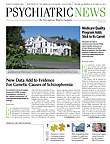Psychiatrists treating Medicare patients and receiving Medicare reimbursement will need to file at least one quality reporting measure before the end of 2013 to avoid a 1.5 percent penalty on their future Medicare reimbursements.
That penalty will be imposed on Medicare reimbursements beginning in 2015. The quality reporting measures are the key component of Medicare’s Physician Quality Reporting System (PQRS), the government’s “pay-for-performance” program to link physician payment to measurements of evidence-based practice rather than just paying a standard fee for every procedure with a CPT code.
Established in 2006, the PQRS has been an incentive program that paid a premium on all Medicare claims to providers who met the PQRS requirements. But now the government is transitioning to a set of incentives and disincentives—a fairly small carrot and a (for now) fairly light stick—in an effort to enlist participation in the program. Thus, to earn the .5 percent premium incentive for 2013 and 2014, clinicians must report PQRS measures for at least 50 percent of their applicable Medicare encounters for both years, but if they don’t submit at least one quality reporting measure in 2013 they will be hit with the 1.5 percent penalty in 2015.
And that penalty will increase to 2 percent on all Medicare reimbursement in 2016.
The PQRS has a list of 259 measures that can be used for claims-based reporting. For solo practitioners and psychiatrists in small-group practices, the most likely method will be to report the measures using a designated G or F code (for example, G8126 or 1040F) on Form 1500.
The G or F code is entered on the Form 1500 below the procedure (CPT) code when filing a Medicare claim, either on paper or electronically, listing 0.00 as the charge for the G and F codes (see link below for sample filing forms).
Of the 259 PQRS measures, there are several that are specifically relevant to psychiatrists—five to be used when treating a patient with depressive disorder, four on screening for unhealthy substance use, one on medication reconciliation, and several others that are less specifically related to psychiatry but can be reported with the CPT codes psychiatrists use.
So, for instance, when a patient is seen for treatment of major depressive disorder (MDD), PQRS measure 9 comes into play, Antidepressant Medication During Acute Phase for Patients With Major Depressive Disorder. That measure indicates that a patient was treated with an antidepressant and stayed on the medication for the entire 12-week period of the acute-treatment phase.
The clinician would list the appropriate code (G8126) below the CPT code when submitting a claim to Medicare to indicate that the patient is being treated with antidepressant medication during the entire 12-week acute treatment phase. If the patient was not a candidate for treatment with an antidepressant for whatever reason, or was not being seen for a new episode of MDD, the code would be G8128.
Robert Plovnick, M.D., APA’s director of quality improvement and psychiatric services, said he hopes psychiatrists understand that participation in PQRS through reporting of quality measures is not “mandatory” in the sense that physicians will be breaking a law if they don’t participate. But they should know that clinicians who don’t submit at least one quality measure before the end of 2013 will be hit with the 1.5 percent penalty in 2015 (as well as foregoing the incentive payments they might receive by submitting measures for 50 percent of their applicable Medicare encounters).
And he emphasized that the incentives and disincentives apply only to Medicare. He urged members who treat Medicare patients, however, to participate in the program, emphasizing that pay-for-performance is the future. And since avoiding the penalty requires only the minimum level of participation, it should be a fairly painless way for clinicians to get a taste of what’s required.
Plovnick noted that properly reporting the quality measures is an administrative task tied to billing and that the APA website has detailed information about the PQRS—including links to sample reporting forms. “Quality measurement is likely to increase in prominence in the coming years, with a possible impact on reimbursement, board certification, and public accountability,” Plovnick pointed out. ■
